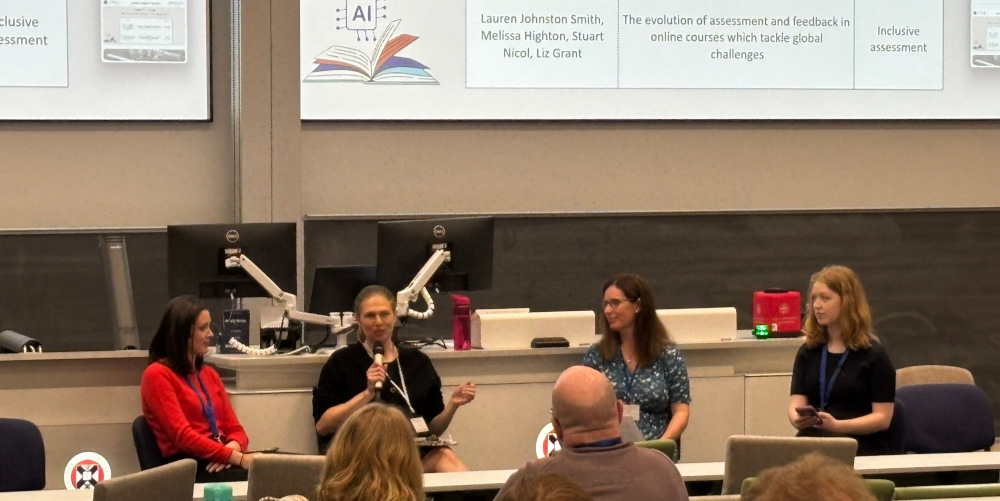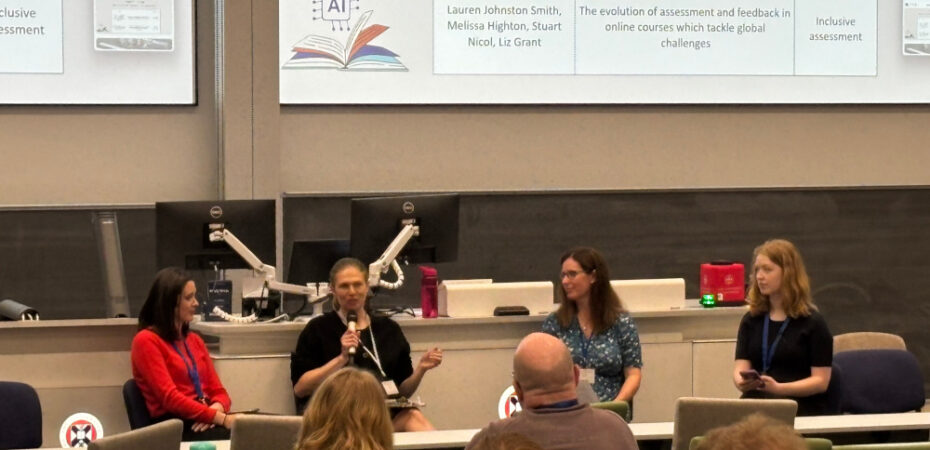
In this post, Lucy Patterson and and Victoria Tait discuss how authentic and inclusive assessment impact on students’ sense of agency and empowerment in response to complex sustainability challenges. This post is based on a panel at the Learning and Teaching Conference, organised by Lucy and Victoria, with guest speakers Helen Szoor-McElhinney and Georgie Ducsai. Lucy is the Sustainability in the Curriculum coordinator, Department of Social Responsibility and Sustainability (SRS), and Victoria is an Academic Developer, Institute for Academic Development. This post is part of the ‘Transformative Assessment and Feedback’ Learning and Teaching Conference series.
Authentic and inclusive assessment can empower students to enact positive change by developing their sense of agency and motivation (Kessels, Xu, Dirkx, & Martens, 2024). These two principles are therefore promoted within the nine ‘Design principles for assessment of sustainability teaching’, developed by colleagues at Manchester Metropolitan University in 2021 on behalf of the Quality Assurance Agency (QAA) (Nicholson & Vargas, 2021). At the 2025 Learning and Teaching Conference, we brought together an academic (Helen) who has embedded these principles in her course assessments, and a student (Georgie) who had experienced this type of teaching, to discuss the ways that these approaches might impact on students’ sense of agency and empowerment in response to complex sustainability challenges.
Inclusivity
Inclusive assessment grants learners’ choice either in content or method of assessment, and aims to minimise exclusion or disadvantage by building flexibility in by design from the start rather than as an adjustment later down the line.
Georgie, a student at the School of Geosciences who took part in the University’s ‘Case Studies in Sustainable Development’ course supported by SRS, shared her perspective on inclusive design in assessment:
“Part of our course assessment was a consulting project for the SRS department. Our course’s assessment offered us as students a remarkable amount of flexibility first in choosing which of eight project briefs we wanted to be part of a group working on. Given the nature of our chosen assignment, which was proposed by the learning and teaching team, this really allowed us to flourish and bring our backgrounds and experiences in delivering education into the work.
Secondly, we had flexibility in leading this project, which pushed us to take initiative with it in a way that wouldn’t have been possible had we had to work within a more rigid outline. Being encouraged to use our imagination and bring our knowledge from other systems around the world and also collaborate closely as a group, are all important skills when we think about working toward preventing [the] climate crisis,”
Helen Szoor-McElhinney, a Teaching Fellow at the School of Engineering and organiser of two courses, Community Engagement with Technology for Sustainable Development, and Sensing in the Community, explained what inclusivity meant to her, and how she designed this into her assessments:
“Students were invited to co-produce an original and self-directed research proposal with community partners in interdisciplinary groups whether that be suitable technologies that enhance health and wellbeing or the development of low carbon transport and homes, through to challenging food insecurity and inequalities within education and employment. Student assessments consider how able students are in communicating and integrating information from a range of diverse disciplinary areas as well as the very rich and profound insights that often emerge from the lived experiences of our community partners.
I often found that students from particular disciplines were more comfortable investigating the research question through one particular lens of sustainability, but very seldom through all three: environmental, economic and social. So this autonomy and agency to look at the problem led to feedback from students that they ended the course feeling that they can have a lot more impact around sustainability within their core discipline than they had originally thought.”
The inclusivity designed into both course assessments allowed for diversity of thought, which let students develop skills for sustainability best suited to their own circumstance. This aligns with other elements of the Design principles, including assessments which are learner-centered, which provide students with a more personalised educational experience that can maximise long-term impacts (Nicholson and Vargas, 2021).
Authenticity
Sometimes called situated assessment, authentic assessment engages with real world problems to go beyond theory. The output of an authentic assessment approach should have the potential for real world influence. Below, Helen and Georgie share their experiences of authentic assessment.
Helen explained:
“The course was designed using a community-based participatory research approach. They [students] were required to contextualize technology solutions so that they effectively responded to the real-world needs of their community partners. To co-produce in this way students needed to build meaningful relationships, develop their negotiation and perspective skills and challenge their own assumptions and world views. Students designed a physical interpretation of their research solutions which they share with their community partners at the final assessment showcase event who often then implement their suggestions and students then felt much more invested in people who live in local communities”.
For Georgie:
“I think I speak for everyone in my group when I say this, but the absolute most gratifying part of the assessment for my project was that immediately after its submission, and before that, even, we saw that the work was going to be going somewhere. And to students who spend so much of their time working on projects that just sit in Drive or in Word afterwards, indefinitely, it means a lot to know that that work was actually going to be going somewhere and doing something. That made it a[n] empowering experience, and we were all interested in participating in other things afterwards because of it, such as this talk or workshops. In fact, had dissertation topics not been decided by that point, I know that a couple of the girls in my group would have loved to try to work on developing this more.”
In both examples, applying assessments in a real-world context was motivational for students and enriched their experience of learning. This supported the development of their sense of agency and potentially leading to valuable impacts on sustainability ways of thinking, acting and being, both in relation to the university and wider community.

Overall, these authentic and inclusive assessments had multiple benefits from a sustainability and learner perspective; from short term potential for socially just real-world impact and greater assessment literacy, to long term empowerment of the students and development of competencies that enable them to act in a sustainable way.
Thanks to Helen and Georgie for participating in the panel and sharing their inspiring inisghts.
Find out more about the nine Design principles for assessment of sustainability teaching.
Read more about the Case Studies in Sustainable Development work.
Watch the video of the panel at the Learning and Teaching Conference – look for ‘Larch Breakout Session 2’.
References
Kessels, G., Xu, K., Dirkx, K., & Martens, R. (2024). Flexible assessments as a tool to improve student motivation: an explorative study on student motivation for flexible assessments. Frontiers in Education.
Nicholson, D., & Vargas, V. (2021). Design principles for assessment of sustainability teaching. In P. Baughan, Assessment and Feedback in a Post-Pandemic Era: a time for learning and inclusion. (pp. 183-195). AdvanceHE.
Nieminen, J. H., Haataja, E., & Cobb, P. J. (2024). From active learners to knowledge contributors: authentic assessment as a catalyst for students’ epistemic agency’. Teaching in Higher Education, pp. 970–990.
 Lucy Patterson
Lucy Patterson
As Climate and Sustainability Curriculum Coordinator, Lucy supports educators across the University of Edinburgh to embed sustainability in their learning and teaching. She works across levels; directly supporting staff through a community of practice, providing learning opportunities for students with the Department for Social Responsibility and Sustainability, and advocating for strategy and systems than enable meaningful learning for sustainability.
 Victoria Tait
Victoria Tait
Victoria Tait is an Academic Developer in the Institute for Academic Development, where she supports colleagues with Programme and Course design, including as part of the University’s Post-Graduate Certificate in Academic Practice. She is a Fellow of Advance HE, and leads the University’s Talking about Teaching workshop series and Engage Network. Her research interests are in the field of sustainability education, and she has over 10 years’ experience supporting educators to reflect critically on how sustainability aligns with their teaching.


